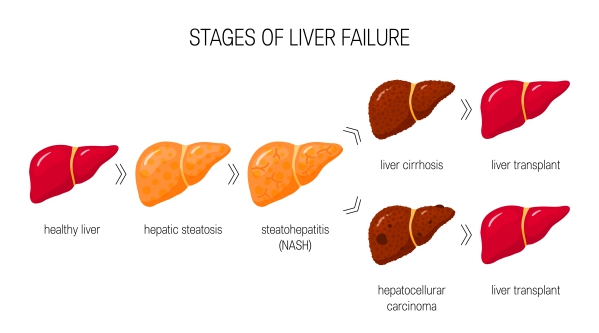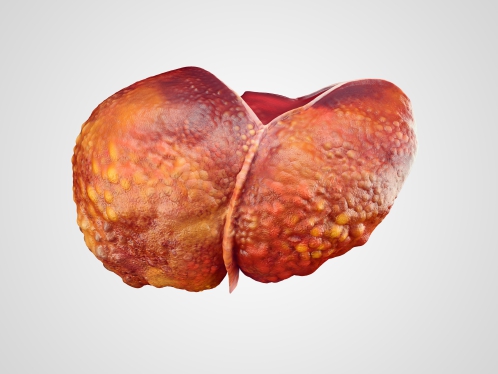What is acute liver failure?
Acute liver failure is when rapid deterioration of liver function occurs within days or weeks. The liver is an organ found beneath your ribs on the right side of the abdomen. The functions of the liver include production of protein, glucose, hormones and detoxification of your blood. Acute liver failure may result from viral infections or drugs.
Acute liver failure usually affects young people and carries a high mortality rate. Drug-related liver failure accounts for at least 50% of cases.
What are the causes of acute liver failure?
There are several causes of liver failure and these include:
- Viruses: There are several viruses which can damage your liver resulting in liver failure and these include cytomegaloviruses, herpes simplex virus, Epstein-Barr virus, dengue virus and hepatitis B & C. Hepatitis E virus can affect pregnant women.
- Drugs: Many drugs can lead to liver failure. Acetaminophen (paracetamol) overdose is one of the most common cause of drug-related liver failure in the United States. There are other medications which can cause liver damage and these include antibiotics (fluoroquinolones, macrolides, and nitrofurantoin), antidepressants (amitriptyline), antiepileptic drugs (phenytoin and valproate), Non-Steroidal Anti-Inflammatory Drugs (NSAIDs) and salicylates. Illicit drugs may also cause liver failure such as cocaine and ecstasy.
- Herbal medications: There are certain herbal medicines which can cause liver failure and these include ginseng, kawakawa, pennyroyal oil and germander tea.
- Toxins: There are some toxins which can lead to liver failure and these include Amanita phalloides mushroom toxin, Bacillus cereus toxin, cyanobacteria toxin, organic solvents and yellow phosphorus.
- Vascular causes: Certain vascular problems may lead to liver failure and these include portal vein thrombosis, ischaemic hepatitis, hepatic vein thrombosis (Budd-Chiari syndrome) and hepatic arterial thrombosis.
- Metabolic causes: Some metabolic problems may lead to liver failure and these include galactosemia, fructose intolerance, Alpha 1-antitrypsin deficiency, Reye syndrome and Wilson disease.
- Cancer: Hepatocellular carcinoma (liver cancer) may lead to liver failure. In addition, liver failure may also occur when cancer that originates from elsewhere spread to the liver such as breast and lung cancer.
- Heat stroke: Extreme physical activity in a very hot climate or environment may result in acute liver failure.
- Shock: Sepsis and shock can severely impair blood flow to the liver resulting in liver failure.

What are the signs and symptoms of acute liver failure?
The signs and symptoms of acute liver failure include:
- Encephalopathy: When the liver is no longer able to remove toxic substances from your blood, your brain will be affected. This may lead to temporary worsening of brain function and confusion.
- Cerebral oedema: This is when your brain swells and is very common in people with acute liver function. This can lead to brain herniation which can be fatal.
- Jaundice: This is yellowing of your eyes and skin.
- Ascites: This is when there is accumulation of fluid in your abdominal cavity.
- Right upper abdominal pain.
- Enlargement of the liver.
- Vomiting of blood.
- Blood in stool.
- Nausea and vomiting.
- Hypotension.
- Increased heart rate.
- Malaise.
- Tremors.
- Sleepiness.
- Sweet smelling breath.


Making a diagnosis
To make the diagnosis of acute liver failure, your doctor will take a detailed history from you to know more about your symptoms. After the history taking, your doctor will perform a thorough physical examination to look for signs of acute liver failure. Your doctor will order some tests in order to confirm the diagnosis and these include:
- Blood studies: The prothrombin time or international normalized ratio (INR) are used to determine how well your blood clots. Usually with liver failure, the ability of your blood to clot decreases as the liver is not able to produce coagulation factors anymore. In addition, liver enzymes are often significantly elevated as a result of severe liver damage. Serum bilirubin and ammonia will be elevated. Furthermore, serum glucose may be dangerously low. In the case of acetaminophen overdose, the level of the drug will be measured to tailor the treatment. Arterial blood gas, serum creatinine, serum free copper, serum phosphate, drug screen and autoimmune markers can also be done.
- Blood culture: Most people with acute liver failure develop infections before or during hospitalisations. Therefore, it is important to get a blood culture in order to know which antibiotics can be used to fight off the infection.
- Viral serology: Hepatitis A Virus (HAV) immunoglobulin M (IgM), Hepatitis B surface antigen and Hepatitis B virus (HBV) anticore IgM serology help to identify acute liver failure due to infection with HAV or HBV. These tests are especially useful in intravenous drug abusers.
- Liver ultrasonography: Ultrasound scan of the liver is useful to assess the presence of ascites and determine how well blood is flowing through the liver veins and arteries.
- Computed Tomography (CT) scan and Magnetic Resonance Imaging (MRI) scan: CT and MRI scans of the abdomen may help to exclude other abdominal diseases and provide detailed information about the liver structure. CT and MRI scan of the head may be useful to assess brain oedema and to exclude any other causes of confusion such as intracranial mass.
- Liver biopsy: This involves your doctor removing a small piece of your liver to be examined under the microscope. If your coagulation profile is deranged, instead of performing a percutaneous liver biopsy (inserting a needle through the chest to get the liver sample), your doctor will perform a transjugular liver biopsy which is when a thin tube is passed into your neck vein to reach your liver where the sample is then taken.


What is the treatment of acute liver failure?
Treatment of acute liver failure is usually treated in Intensive Care Unit (ICU) setting. Treatment of acute liver failure include:
- Acetylcholine: Acetaminophen overdose is treated using a drug called acetylcholine.
- Diuretics: These drugs are used to remove excess fluids in the brain and an example is mannitol.
- Liver transplant: When treatment of acute liver failure fails, the last resort treatment is liver transplant.
- Antibiotics: If there are signs of infection, your doctor will prescribe antibiotics to fight off the infection.
- Preventing severe bleeding: Medications to reduce the risk of bleeding will be given as your coagulation factors will be low due to acute liver failure. In addition, if your haemoglobin level is low, blood transfusion may be necessary to bring the level back to normal.
What are the complications of acute liver failure?
Potential complications of acute liver failure include:
- Seizures
- Haemorrhage
- Infection
- Renal failure
- Metabolic alkalosis or acidosis

Source:
J. Alastair, I. and Simon, M., 2016. Davidson's Essentials of Medicine. 2nd ed. London: ELSEVIER.
Parveen, K. and Michael, C., 2017. Kumar & Clarks Clinical Medicine. 9th ed. The Netherlands: ELSEVIER.
Sood, G., 2020. Acute liver failure



